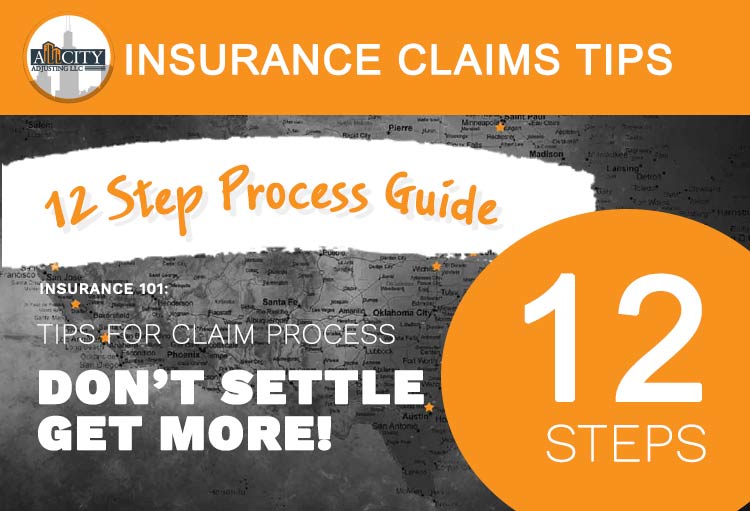Written by Andy Gurczak
June 22, 2021

Insurance Claim Filing: The Basics
To properly undertake and complete an effective insurance claim filing you need to maximize your claim settlement and restore your property back to pre-loss conditions. Also, maybe even return your home or business to a better condition than it was before the incident. Losing your home and all of your belongings to a fire is devastating enough. What many policyholders don’t know is that the frustration of dealing with your insurance can be much more devastating than the fire itself. Luckily, there are a few tips for filing your insurance claim. Keep on reading to learn more. In short, the following 12 Insurance claim filing tips and process guide will make you more competent and capable when dealing with your insurance company.
1. File your insurance claim right away
Insurance policies require policyholders to file their insurance claims as soon as possible. For this reason, you should call your insurance agent immediately to get the process started. First, the insurance company will likely require you to submit a “proof of loss claim”. For this part, you list all of the items you lost in the accident, including their respective value.
Your prompt action is especially important if there was a natural disaster in your area. If you don’t act immediately, you could fall to the bottom of claimants list and it could be a long time before the adjuster reaches you. The following is a list of information you can include in your claim:
- Date of loss
- Type of loss or damage
- Location of damage
- Related injuries
- If anyone else was involved or affected
- Condition of the home
- Description of damaged contents
- Any necessary temporary repairs
- A police report
If you act promptly, your insurance company should also be quick to act on your insurance claim. In fact, the law requires insurance companies to handle claims on time and before a deadline.
If your insurance company is taking too long to get back to you, let them know that you’re sending a copy of the letter to the state’s Department of Insurance. This should prompt the company to act, as they will not want to make a mistake or drag their feet if they know they are being monitored.
2. Compile a list of everything before filing an insurance claim: “Proof of Loss”
As mentioned before, having a list of all of your valuables is important and necessary. If you didn’t have one before the fire, then it’s better to make one as soon as possible. Hiring a public adjuster could make this process a lot easier. Include everything that you’ve lost , as well as its approximate valuation. Do this before you file your insurance claim.
It is extremely important not to throw anything away. It is much easier to prove your loss on the items identified on your list if you hold on to them. Throwing them away may result in your insurance company refusing to compensate you appropriately.
3. Organize yourself more a more successful insurance claim
Dealing with insurance companies is a very complicated process. It involves countless calls, emails, letters, and documents. For this reason, you should keep track of all of the documents and communication related to the insurance claim from the very beginning.
Take notes, including the date and time, of every phone conversation and face-to-face meeting. Use a binder or file organizer to organize the different types of correspondence, invoices, bills, permits, contracts, and insurance forms. Preferably, you should arrange each of these files into their own separate section. Remember to always keep original documents of everything. If your insurance company wants proof of a document, make them a copy and keep the original. The more organized you are, the better prepared you’ll be for settlement negotiations and solving any problem that arouses.
4. Hire a Public Adjuster to handle your insurance claim
If you don’t know what a public adjuster is or does, know that they are your advocate during your claims process. They work directly with your insurance company to maximize your insurance claim and make sure your property is properly restored. Public Adjusters are experts in insurance claims. They are especially important when you have a large catastrophic insurance claim such as a fire. Hiring a public adjuster as soon as you can is your best chance to reduce your stress and frustration, and maximize your claim settlement for your loss.
It is important that you don’t hire just any public adjuster. Instead, do your research and check their references. In fact, you should look into the results that they have achieved for their clients. As aforementioned, public adjusters can even help with your “proof of loss” claim. For this reason, it’s a good idea to hire a public adjuster to handle your insurance claim, from the very start.
5. Additional Tip: Verify the adjuster’s identity.
The insurance company will assign an adjuster, who will assess the damage and submit an estimate for review. Scammers can sometimes show up after natural disasters to pretend they are insurance adjusters. To protect yourself, ask the insurance company for the adjuster’s name before they arrive. Once the adjuster gets to your home, ask for identification and don’t let them in until they have.
Show the adjuster all the damage.
Make sure that you are home when the adjuster visits. This way, you can be sure that he or she gets a complete view of everything lost or damaged. It’s not enough just to walk through part of your home.
6. Mitigate further damage
Your insurance company requires you to take care of your property even after a fire loss. If it is a total loss then this is most likely unnecessary. For the undamaged sections of your home or business, your insurance company will require you to take action to prevent any further damage from occurring. Most homeowner’s insurance policies cover the cost of damage mitigation.
The following are some of the mitigations measures you might need to take after a catastrophic loss:
- Boarding any openings in the structure to prevent looters
- Moving any undamaged property to a safer location
- Covering up holes and protecting belongings from any weather damage
- Drying and remediating water damage
7. Seek an advance on your insurance claim
If you had to leave your property due to your loss, you may be eligible for an advance from your insurance claim. These advances are meant to help you take care of your immediate needs. For instance, you could use an advance to purchase essentials like clothes, toiletries, food, and other essential necessities. Remember, keep your purchases practical. Otherwise, your insurance company may refuse to reimburse you for acquisitions they consider unnecessary. Also know that this advance is deducted from the total amount you receive from the insurance company, so be wise about your spending.
8. Remember to track all your additional living expenses
After a fire loss, there will likely be many more expenses in your daily lives additional to the restoration cost. These are considered by the insurance company as “Additional Living Expenses” (ALE). Your insurance policy includes a clause called “loss of use”, which reimburses you for these additional living expenses while you are displaced from your damaged property. Once you file an insurance claim, your insurance company will reimburse you the difference between the costs of the displacement and the cost of your regular living expenses.
For instance, because of a fire you are now displaced from your home. As a result, you have to pay for a hotel room, to get your laundry done and to eat out. Your living expenses used to be $4,500 a month, but because of these extra expenses, your monthly expenses have doubled. Your insurance company will reimburse you for the additional $4,500 you are now spending.
Many times, people decide to stay with family members or friends instead of a hotel room. Some insurance companies reimburse your hosts for the additional costs of your stay, so ask your host to calculate the additional costs. A public adjuster can help you identify and keep track of all of these additional living expenses and costs associated with loss-of-use. This is extremely important for any possible insurance claim settlement negotiations.
9. Get the right repair estimates to maximize your insurance claim
Insurance claims enable you to repair or even rebuild your damaged home after a fire. For instance, “Actual cash value” policies give you the amount of money it would take to return your home and its contents, to the pre-loss fair market value.
“Replacement” policies entitle you to the amount it would take to replace the home and its contents, regardless of the value of what you lost. However, replacement coverage doesn’t require you to rebuild your home in the same location. You can choose a new location as long as it’s the same value. Of course, if you move to a more expensive location, you pay the difference. If you decide not to rebuild, but to invest the money in something completely unrelated, the “replacement” policy will become an “actual cash value” policy. Nonetheless, the payout of an “actual cash value” is 15% less than “replacement”.
Insurance companies do require an estimate of the fair market value or cost of replacement. For this reason, insurance companies send out their own adjusters to make estimates that fall under the company’s best interest instead of yours. Remember, you don’t have to accept the numbers that they give you. It’s probably a better idea to hire your own independent estimator or contractor. Don’t accept any amount from the insurance company unless you’re certain it’s a fair payout.
Be picky when choosing a contractor. Make sure they have experience dealing with insurance companies. Be getting any work started, be sure that you, your contractor and the insurance company agree on the scope of the work to be done.
10. Keep paying your insurance premiums
Many people make the mistake of discontinuing their insurance premiums once they’ve filed fire insurance claims. Your homeowners’ insurance includes liability protection for your home and even pets. For example, if because of stress, any pets cause further damage, your insurance will likely cover it as well.
Furthermore, remember to give your insurance agent the information of where you’re staying. Have that added to your liability coverage. You can also ask for a cut back to the section of the policy that covers the structure of your home, in the case that your home was a total loss. This will help reduce your insurance premium. However, don’t forget to adjust this after your new home is ready.
11. You decide when to finalize your insurance claim
Insurance companies want to quickly close out your insurance claim, especially if there was a local natural disaster. The longer your keep your claim open, the greater the chance you’ll discover something you overlooked previously. This is why it’s a good idea to wait some time before agreeing to finalize your claim.
In fact, the insurance company may try to add a note to your check which designates the closure of a claim. If you choose to appeal this, you should cross out any language related to the closing of your claim. Furthermore, you should initialize or sign it, and proceed to send them correspondence asserting that you do not consider the claim closed.</p
12. Don’t worry about losing your insurance coverage after filing your insurance claim
Worried about your insurance dropping you after filing an insurance claim? As long as you file only legitimate claims after real disasters, you’re not a “habitual claimant.” Additionally, there’s no evidence of fraud on your part. Because of this, you will not lose your coverage.

Best way to beat the insurance company is to hire AllCity Adjusting
At AllCity Adjusting we help residential and commercial clients alike get the claims support they need. Moreover, we have over 50 years of combined experience helping get our clients the max settlement time and time again. If your claim has been low balled or denied entirely we can help increase your maximum settlement. Call us today for a FREE consultation. Experience the AllCity difference.
Real Support When You Need It!
Related Articles
7 Red Flags That Indicate You Need to Hire a Public Adjuster
If you own property, managing roofing insurance claims might seem tough. Knowing how to quickly deal with roof damage insurance claims from water, weather, fire, or unexpected events is helpful. In this guide, we’ll share useful tips to help you understand and work through roofing insurance claims more easily, aiming for a quicker solution.
Navigating Fire Damage Claims: What Every Property Owner Should Know
If you own property, managing roofing insurance claims might seem tough. Knowing how to quickly deal with roof damage insurance claims from water, weather, fire, or unexpected events is helpful. In this guide, we’ll share useful tips to help you understand and work through roofing insurance claims more easily, aiming for a quicker solution.
The Role of a Public Adjuster in Water Damage Claims
If you own property, managing roofing insurance claims might seem tough. Knowing how to quickly deal with roof damage insurance claims from water, weather, fire, or unexpected events is helpful. In this guide, we’ll share useful tips to help you understand and work through roofing insurance claims more easily, aiming for a quicker solution.
Understanding Water Damage Claims: A Comprehensive Guide for Homeowners
If you own property, managing roofing insurance claims might seem tough. Knowing how to quickly deal with roof damage insurance claims from water, weather, fire, or unexpected events is helpful. In this guide, we’ll share useful tips to help you understand and work through roofing insurance claims more easily, aiming for a quicker solution.
Time Limits for Filing Commercial Roofing Insurance Claims
When floods, storms, or fires destroy roofs, insurance claims can save homeowners. However, property owners must be aware of the commercial roofing insurance claim deadline. We’ll explain this crucial period in this piece to help property owners manage the claims procedure.
The Role of Insurance Adjusters in Commercial Roofing Claims
For commercial property owners, dealing with roofing insurance claims can be complex. This is where a Commercial Public Insurance Adjuster becomes vital. They help property owners who might struggle to understand their insurance policies, especially when it comes to roof damage from water, storms, or fire.
Stay Up to Date With The Latest News & Updates
Don’t Wait – Get More
Get a free 1 hour consultation on your next call. So call today and challenge the insurance company narrative on your policy claim. We can help you with all your public adjuster claims support. Let us help you get more.
Join Our Newsletter
Do you want to learn more about public adjusting. In this newsletter we create helpful tips and hints and you will receive notifications when we post new articles.
Follow Us
Follow us on the following social networks.






Recent Comments